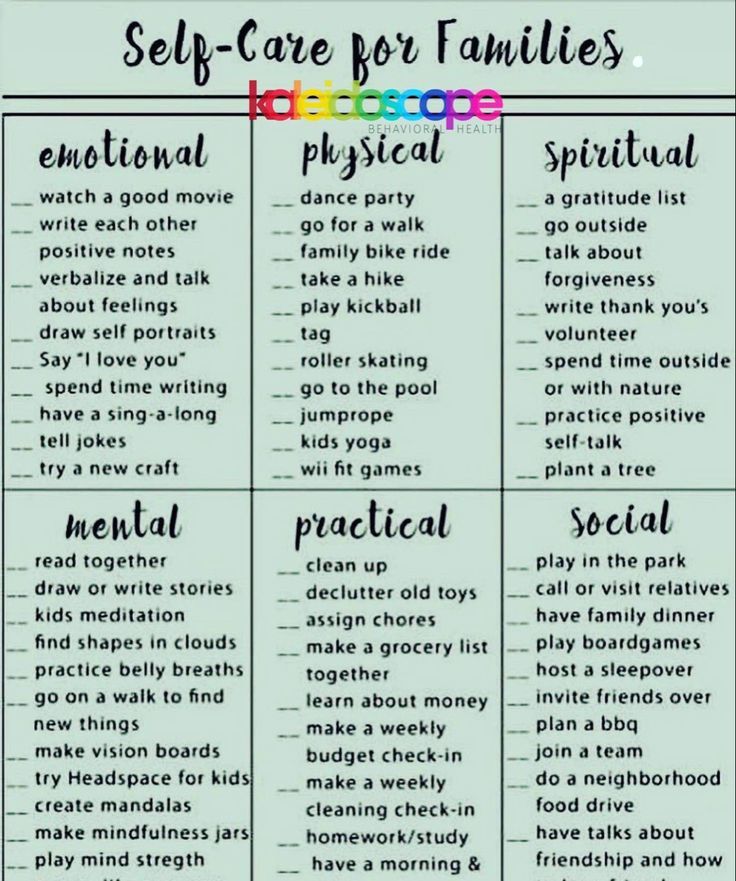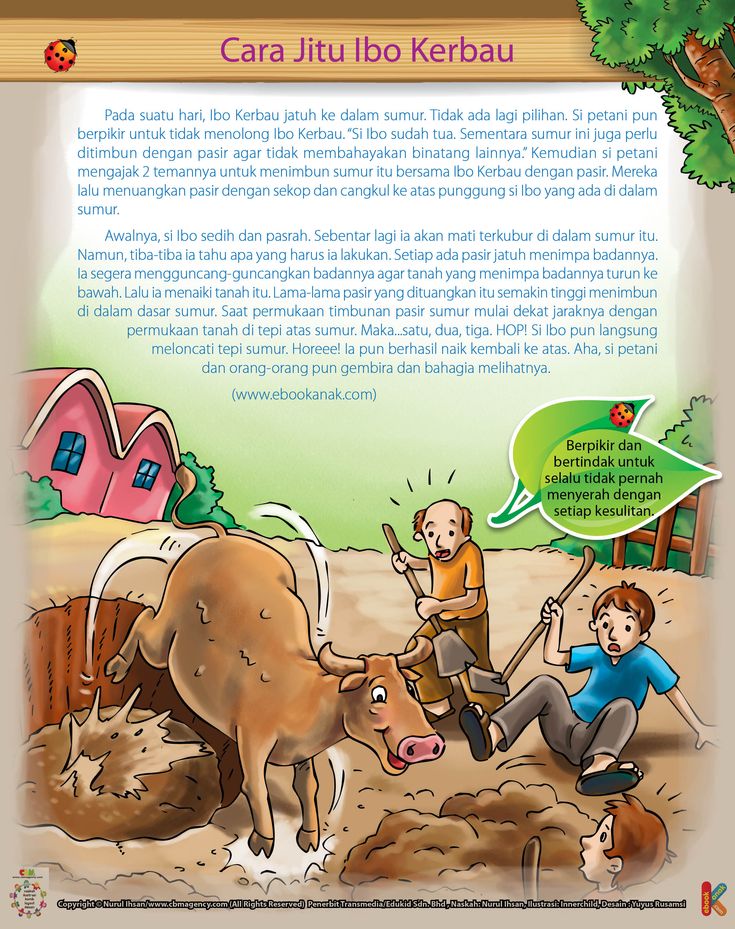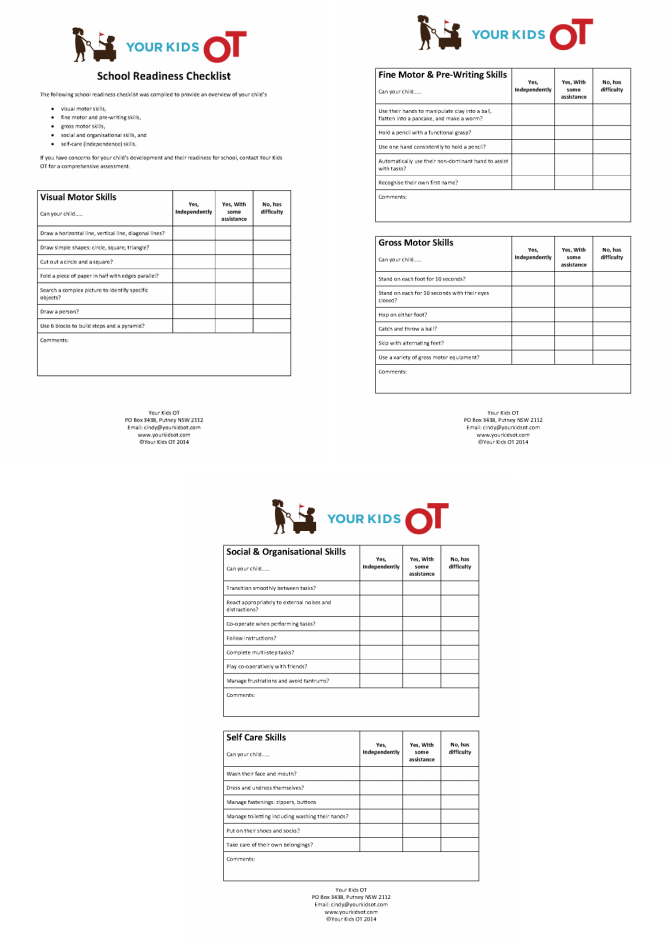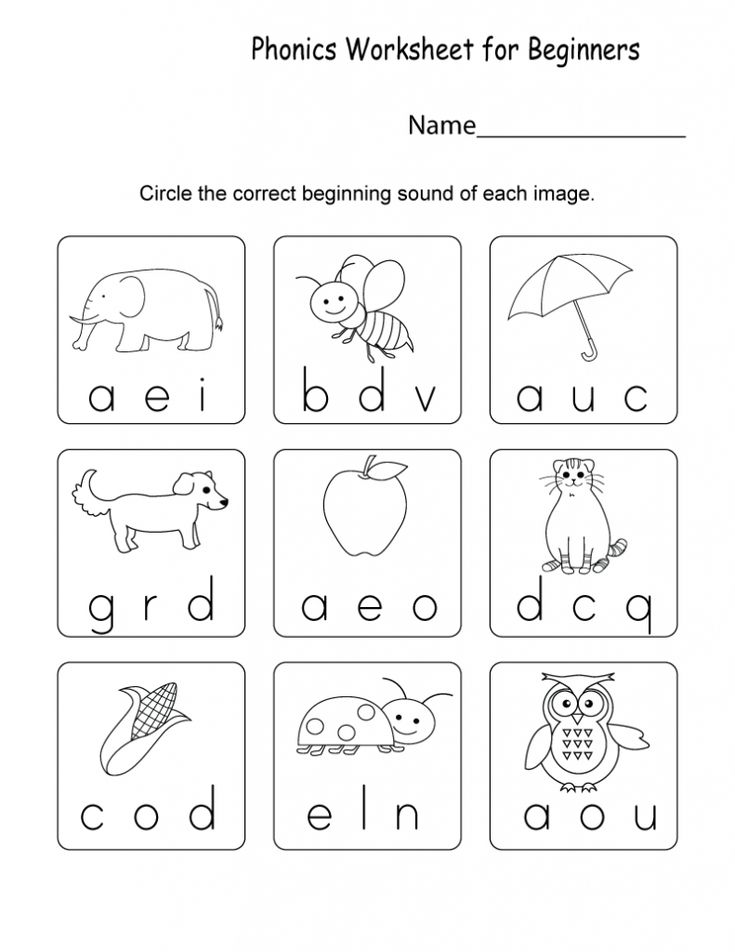Family rituals ideas
20 Family Tradition Ideas to Strengthen Bonds and Make Memories
Jump to section
What are family traditions?
Why are family traditions important?
20 family tradition examples
How to keep family traditions going
Self-care as your own tradition
The importance of spending time together as a family is indisputable. Having healthy human connections with our family members is crucial for our social well-being and overall wellness.
Yet, according to research, the time families spend together doing a shared activity is significantly low. American families spend just 37 minutes of quality time together per day.
One of the best ways to reconnect with your family is through family traditions.
Whether you have a long-standing tradition you’ve been doing for years, or you’re looking for a new family tradition, we’re here to help.
Let’s explore the importance of family traditions in today’s fast-paced world, as well as some great ideas for new traditions for your household.
What are family traditions?
A family tradition is an activity or pattern of behavior that reflects a family's values, interests, or beliefs. Once established, it will hopefully be passed down through the generations. It represents your specific family unit and is like your own family culture.
The traditional nuclear family is less common today than previous generations.. Blended families, extended families, couples without children, and chosen families all have traditions too.
These families may not span several generations. But even if they’re brand new, they’re something that should be celebrated.
Even a friendship group or chosen family, can consider themselves a family and create traditions that resonate with them.
Some family traditions may have symbolic significance. Your family might travel to a specific location as a site of celebration — much like a religious pilgrimage. But while tradition is commonly associated with religious rituals, it can also be a secular event.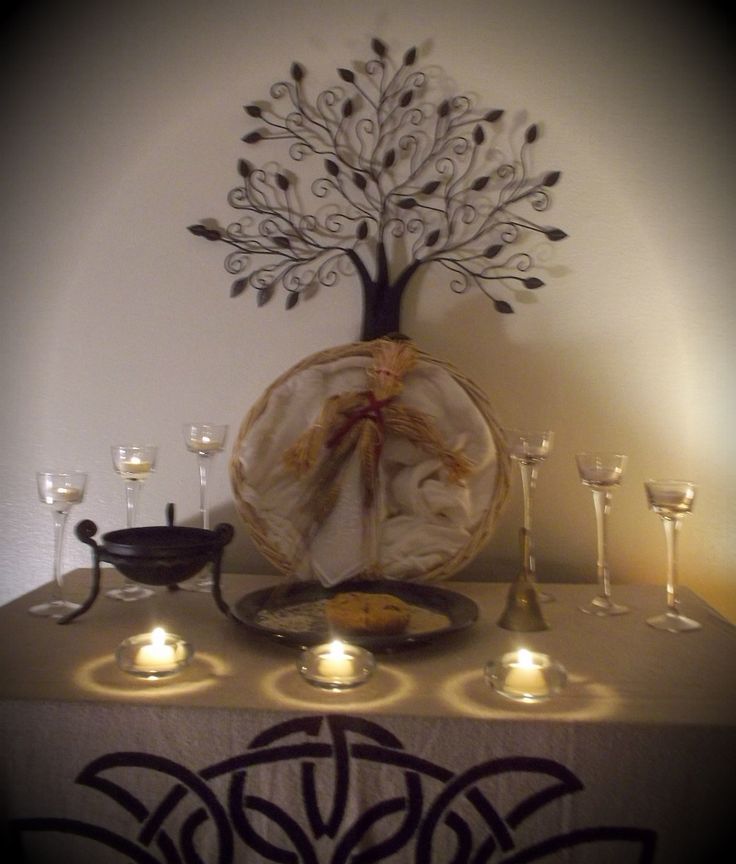
Anyone who comes from a home that celebrates family traditions can attest to the powerful bonding potential of these occasions. It’s a moment in which your family commits to spending quality time together.
With time and a little effort, every family, no matter how big or small, blended or chosen, can establish a unique set of traditions. These traditions can connect them to one another and to themselves.
What are some common family traditions?
Many families around the world share common family traditions. There are certain celebrations and holidays that give family members the time to come together and do something as a family.
Here are some examples of common family traditions from around the world:
- Decorating the Christmas tree as a family. Although this tradition is connected to a religious holiday, it has become widespread around the world. In the US alone, 94 million households will have at least one Christmas tree during the holiday season.
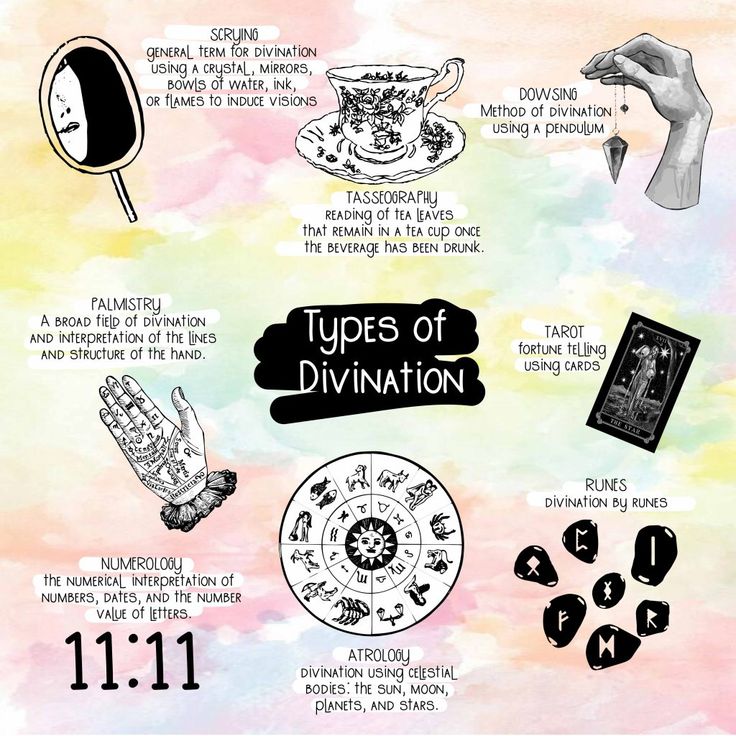
- Hiding baby teeth under a pillow for the tooth fairy. What started out as folklore from the Middle Ages has become a widely practiced family tradition.
What are family traditions unique to certain cultures?
While they may be common in their country of origin, there are family traditions that are unique to certain cultures.
Let’s look at some examples of unique family traditions from around the world:
- Honoring ancestors in Japan. Many Japanese homes have a small family altar, or butsudan, as a sign of respect for elders who have passed away.
- Celebrating the first day of school in Germany. On the Einschulung, the first day of grade one, children are given a Schultüte. This is a decorated cardboard cone filled with sweets, school supplies, and small books to celebrate the day.
Why are family traditions important?
Family traditions vary in how they’re celebrated, but they all have a common thread of importance:
Creates a sense of comfort and security
The value of ritual should never be underestimated. In our increasingly chaotic and fast-paced world, we tend to go through life with a sort of tunnel vision. This coping mechanism can manifest as an all-consuming short-sightedness and anxiety that chips away at our free time.
In our increasingly chaotic and fast-paced world, we tend to go through life with a sort of tunnel vision. This coping mechanism can manifest as an all-consuming short-sightedness and anxiety that chips away at our free time.
Establishing a family tradition that happens on a set day creates a sense of rhythm and order. Despite everybody’s busy schedules, setting aside time is incredibly important for nurturing family connections. This is grounding and comforting amongst the unpredictable world we live in.
Gives a reason for the family to get together
You shouldn’t need an excuse to spend time with your family. That being said, sticking to a date is often necessary to coordinate everyone’s jam-packed schedules.
Creating a family tradition encourages respect and commitment. You are much less likely to cancel on a time-honored family tradition than a casual lunch. These celebrations give family members something to look forward to and bring them together.
Promotes a healthy work-life balance
Because of COVID-19, remote work is now a way of life for millions of Americans. While telecommuting has its benefits, it can also make it difficult to achieve a work-life balance.
Since the workplace is where you spend the majority of your time, it may be tempting to isolate yourself from the rest of the world. But celebrating family traditions encourages us to invest time and energy into our personal lives as well.
Creates good family dynamics
Many family members lead vastly different lifestyles to their relatives. But these celebrations are an opportunity to set aside your differences. Even if you all have different interests and opinions, you can bond over your shared family experience.
Celebrating family traditions nurtures relationships between family members. This connection is priceless and fosters positive family dynamics.
Gives family members a sense of belonging
Family traditions foster a family identity that gives each member a sense of belonging and personal pride.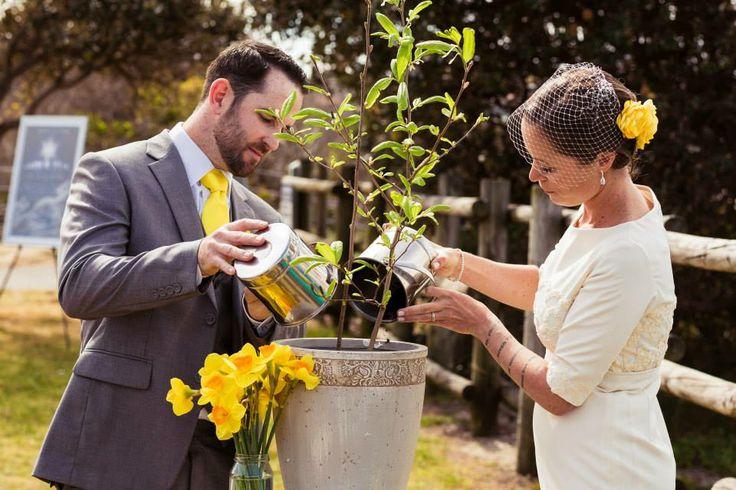
When you feel safe and secure in these family connections, you have a base of emotional support to return to throughout your lifetime.
A sense of belonging to family and community is essential for social and emotional well-being.
Keeps cultural or religious traditions going
In some cases, family traditions and religious or holiday traditions go hand-in-hand. This is because your culture and religion are typically learned from your family at a young age.
As you grow up, you might feel as if you are drifting further and further away from the values and rituals of your familial culture or religion. This is an excellent opportunity to reconnect with your roots and strengthen your spiritual wellness.
20 family tradition examples
What are some unique family tradition ideas you can start with your family?
Whether you’re looking for inspiration for new traditions or trying to understand what old ones may look like, this list can help.
1.
 Swim on the first day of spring
Swim on the first day of springCollect your swimsuits and head down to your favorite beach to celebrate this symbolic moment of rebirth with your family.
2. Make homemade gifts for Christmas, Hanukkah (or birthdays)
Homemade Christmas gifts communicate your love and authentic appreciation. They also allow you to avoid the consumerist rush of the season.
3. Go hiking in the same place or at the same time
Spending time with your family in the great outdoors is a healthy and energizing bonding activity.
4. Have a movie night
Cuddle up by the fire to watch a classic family film together.
5. Visit the same restaurant
Eating a family meal together is one of the most ancient and sacred forms of socialization. Start a family tradition of visiting your favorite restaurant, whether for a birthday, anniversary, or just because.
Beyond the pleasure of sharing a meal, eating together as a family also has psychological benefits.
6. Do a family digital detox
A survey found that parents only spend 24 more minutes with their kids than on their phones.
Start a family tradition of taking a digital detox once in a while. Turn off your devices to connect with each other instead of your social media contacts.
7. Take up a new activity as a family
Start a tradition of learning a new skill or taking up a new hobby as a family. While everyone may already have their own interests, learning something new together is a great bonding experience.
For example, combine family time with exercise and take up online yoga.
8. Start a gratitude jar
Express your gratitude by writing down what you appreciate about your family. Place it into a communal gratitude jar that you can later reflect on.
9. Do something for the community
Studies show that any act of altruism is connected to positive physical and mental effects. Benefit from these effects as a family by giving back to the community together.
10. Go camping
Escape the city and take your family on a camping trip. Being in nature without constant technological stimulation allows you to connect with your family in a deeper and more heartfelt way.
11. Celebrate the full moon
Synchronize family time with the celebration of the new moon to establish a monthly tradition.
12. Ritualistic fire ceremony
Every New Year’s Eve, write down what is on your mind and burn it in a communal fire. Use this ritual as an act of appreciation and letting go of the past year.
13. Cook family recipes
Cooking and sharing family recipes is an excellent way to keep your family’s culture alive.
14. Make a family scrapbook
Start a tradition of coming together to print and assemble family photographs. This ritual allows you to reflect on special memories together.
15. Game night
A fun family tradition is hosting a family game night. Every Friday night, gather around the dinner table and play your favorite board game for some healthy family competition.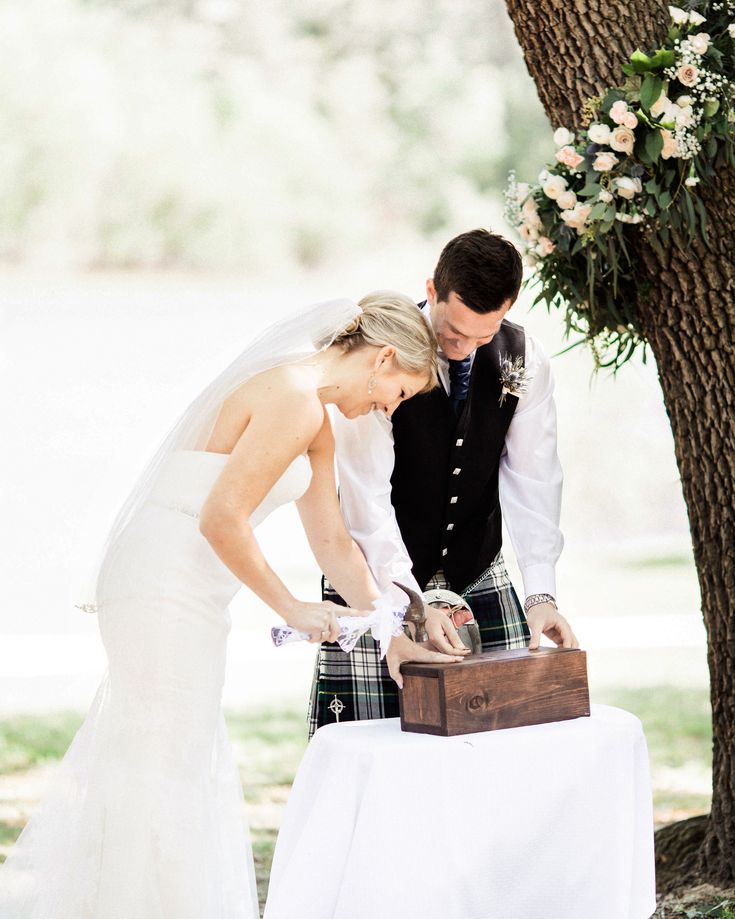
16. Show and tell celebrations
Present special objects and share their stories with your family members. Use this tradition to gain insight into your family history and the lives of your relatives.
17. Talent show
Showcase your learned skills and appreciate the talents of your relatives at a family talent show.
18. Family interviews
Conduct casual family interviews to gain greater insight into the hearts and minds of your family members.
19. Fruit picking
This activity is a sweet excursion that the whole family will enjoy. Afterward, you can feast on the fruits of your labor.
20. Decoration days
Come together to set up decorations for your favorite holiday. Building a Sukkah for Sukkot and draping it with paper chains is a traditional family activity in Judaism. But you can get creative with any holiday, from Holi to the Lunar New Year.
How to keep family traditions going
If there’s no effort to maintain traditions, they will probably die out. Use these tips to keep them going year after year:
Use these tips to keep them going year after year:
Get input from the whole family
A family tradition should be a moment of connection and celebration. Every member should feel as if their voice is being heard and respected. Collaborate on ideas and be receptive to new suggestions and compromises.
Do something everyone is interested in
Every family member needs to be somewhat invested in the family tradition for it to be sustainable and meaningful. Find a common interest and capitalize on that.
Set aside time for family traditions
Family traditions may fall to the wayside without proper planning and time management. To prevent this from happening, use time blocking to set aside time for the occasion.
Keep it simple
Overcomplicating a family ritual may detract from its fun aspect and make it a stressful affair.
Keep it simple, genuine, and inclusive. Remember that a family ritual is meant to be a moment of relaxation, connection, and appreciation. Skip superficial measures and focus on what is really important.
Skip superficial measures and focus on what is really important.
Take a break from technology
Technology is the ultimate distraction and barrier to connection. While you may be tempted to photograph every moment of a family celebration, try to be present and capture the moment mentally. The less technology is present, the more present you and your family members can be.
Stay positive
Remember that not every family tradition will always be a smooth-sailing easy affair.
While family comes with an abundance of love and support, it may also come with a number of internal tensions and challenging histories. Be sensitive to this and don't give up on fostering strong familial ties. Maintaining healthy boundaries is a way of taking care of your family relationships.
Be open to change
You might need to alter family traditions as the years go by in order to preserve their longevity. Be willing to adapt to change. For example, you might need to compromise to cater to generational differences as the children of the family grow up.
Self-care as your own tradition
Nurturing familial connections is just as important as investing in your relationship with yourself. It’s challenging to feel authentically connected to others when you are not connected to your own emotions and needs.
As much as we love our family, bringing the family together can cause a lot of stress and worry, especially during the holiday season. Combat this stress by taking a moment for yourself and practicing self-care.
Everyone has a different understanding of self-care. For some, their morning jog might be essential to their self-care plan. For others, it could mean dedicating time to mindful breathing or visiting a therapist every week.
Ultimately, as long as it is a healthy habit and it works for you, you should prioritize it. Investing in your relationship with yourself is an investment in every other relationship in your life.
Start family traditions to strengthen family bonds
Family traditions play a key role in the overall health and balance of a family. Whether you’re reigniting old celebrations or starting a new ritual, family traditions foster a sense of unity and appreciation.
Whether you’re reigniting old celebrations or starting a new ritual, family traditions foster a sense of unity and appreciation.
Everyone deserves to have a healthy relationship with their family members. The sense of belonging and network of support that family provides can create resilient happiness in an uncertain world.
If you’re seeking more insightful life-coaching tips or want to improve your holistic well-being, chat to BetterUp today.
41 Family Rituals That Teach Responsibility, Positivity, Kindness
Every night at bath time, my three-year-old daughter chooses five bath toys, and we take turns tossing them into the tub. “CANNONBALL!” we shout.
Once all the toys are in the water, I turn to my daughter. “Hmm…something’s missing. What is it?”
She grins, jumping up and down. “Me! Me! Me!” she chants, until I scoop her up and put her in the tub.
It may sound silly, and it’s certainly very simple, but this is one of our family rituals. This one-minute ritual brightens our moods, strengthens our bond, and even makes my daughter look forward to bath time each evening.
This one-minute ritual brightens our moods, strengthens our bond, and even makes my daughter look forward to bath time each evening.
You probably have several family rituals and traditions of your own, perhaps without even realizing it. But if you don’t have any yet, or if you’d like to create some new ones, read on for family rituals and traditions ideas and inspiration!
Before you continue, we thought you might like to download our FREE Personal & Family Values. This printable provides a great opportunity for your family to explore and identify values that can help guide you and your children in making the right choices.
What are family rituals?
It’s sometimes difficult to distinguish between rituals and routines. According to psychologist Barbara H. Fiese, rituals and traditions symbolically communicate the idea that “this is who we are” as a group, providing continuity in meaning across generations.
On the other hand, routines are a way of communicating, “This is what needs to be done.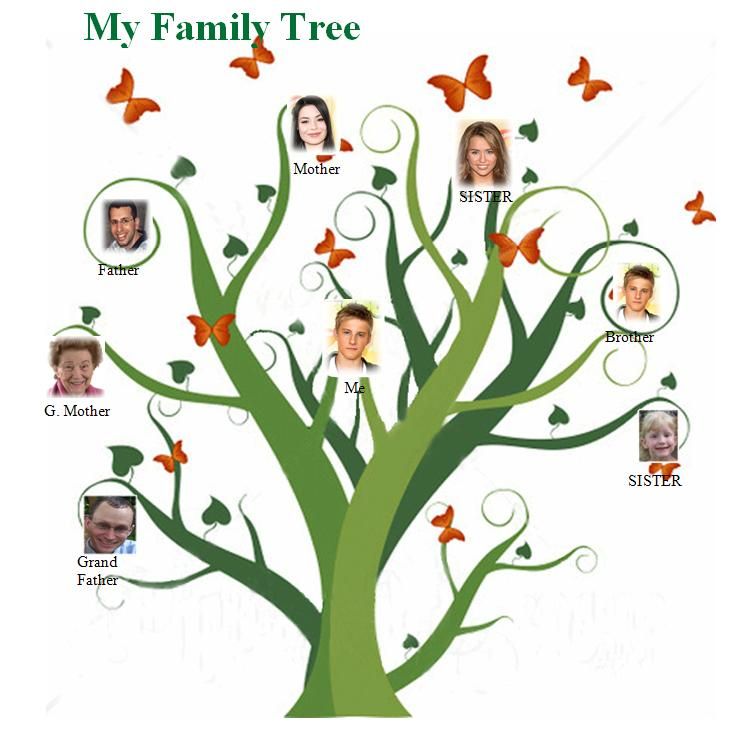 ”
”
For example, bathing your child at 7:00, followed by bedtime at 7:30, is a routine. But if you incorporate personalized moments like a special kiss, handshake, or song, you can transform the routine into a meaningful ritual.
Why are family rituals important?
Rituals allow families to slow down and connect, and they’re associated with all sorts of powerful benefits.
Fiese and her colleagues at Stanford conducted a review of 50 years of research on family rituals and traditions, published in the American Psychological Association’s (APA) Journal of Family Psychology.
According to the review, both family routines and rituals provide stability and are associated with adolescents’ sense of personal identity, children’s health, academic achievement, and marital satisfaction.
Maintaining these routines and rituals even during times of transition like divorce can lower levels of conflict and help children adjust to change, protecting them from the proposed risks of nontraditional families.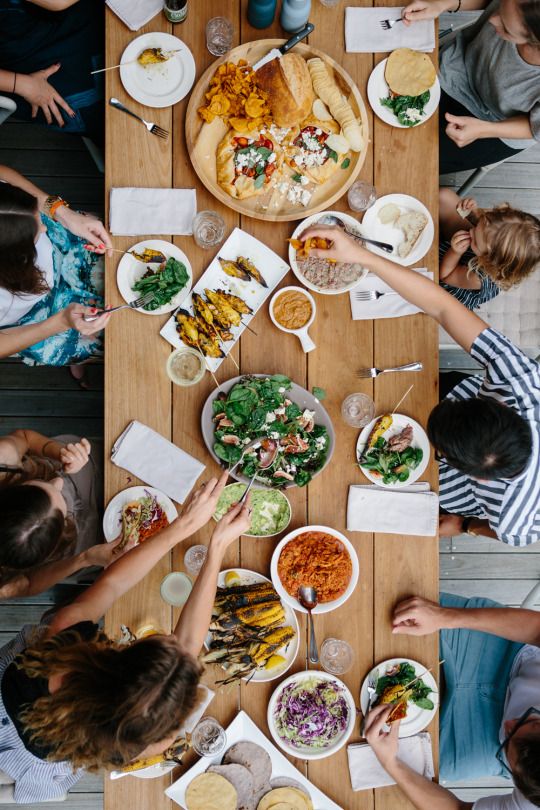
If you’re interested in starting some family rituals (or adding to your current list), take a look at the 41 best examples of family rituals and traditions below.
Family rituals that teach responsibility
Rituals can be a fun way to teach your child responsibility.
1. Assigned Tasks - For example, assign each family member a specific task when setting the table: one family member clears the table, another sets out napkins, one distributes silverware, and a fourth lights some candles.
You can do the same when preparing breakfast, lunch, or dinner, perhaps to the sounds of our “Love Yourself Mix” on Spotify.
The word “chore” has a negative connotation, but you can make chores a positive family ritual that teaches responsibility.
In many cases, kids don’t mind helping out - it makes them feel special and capable! And family chores can teach your child that your family is a team that operates best when they contribute.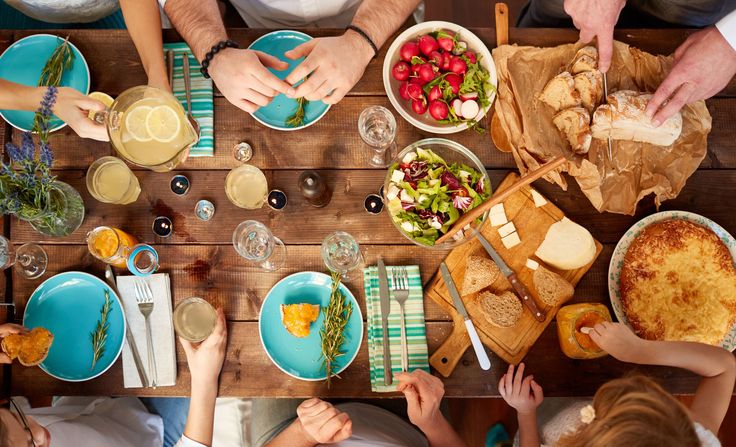
2. Rotating Chores - For instance, have a rotating chore chart on a whiteboard that changes each Sunday. Or you could write a variety of chores on Popsicle sticks, then have each family member draw a stick or two to determine their chores for the week.
3. Designated Chore-Time - Designate a particular time each week (usually Saturday or Sunday afternoon) when the entire family comes together to clean the house. You can play music, talk, laugh, dance around - but the chores must get done!
4. Collaborative Projects - Finding projects that the entire family can collaborate on is also a lot of fun, whether you are shelling peas, doing one of the activities from painting a wall, or constructing a crib for an upcoming addition.
These rituals show your children that hard work can be fun, and they’ll learn about responsibility from a young age.
Rituals that promote kindness and compassion
Rituals like loving-kindness meditation and volunteering as a family can teach your child the importance of kindness and compassion.
5. Loving Kindness Meditation - It involves thinking of loved ones and sending them positive thoughts or “good-hearted wishes.” You can eventually expand the positive thoughts to more neutral people in your life as well.
The four traditional phrases are, “May you feel safe. May you feel happy. May you feel healthy. May you live with ease.” But the exact well-wishes your family uses aren’t important; it’s about generating feelings of kindness and warmth.
Research shows that loving-kindness meditation results in increased mindfulness, purpose in life, and positive social behaviors, like generosity.
6. Family Volunteering - Find a place you’d like to volunteer as a family, such as a nursing home, an animal shelter, or a soup kitchen.
Alternatively, have your children help with projects like donating food, clothing items, school supplies, or toys.
When you volunteer as a family, you set a great example for your children and teach them to demonstrate compassion and kindness.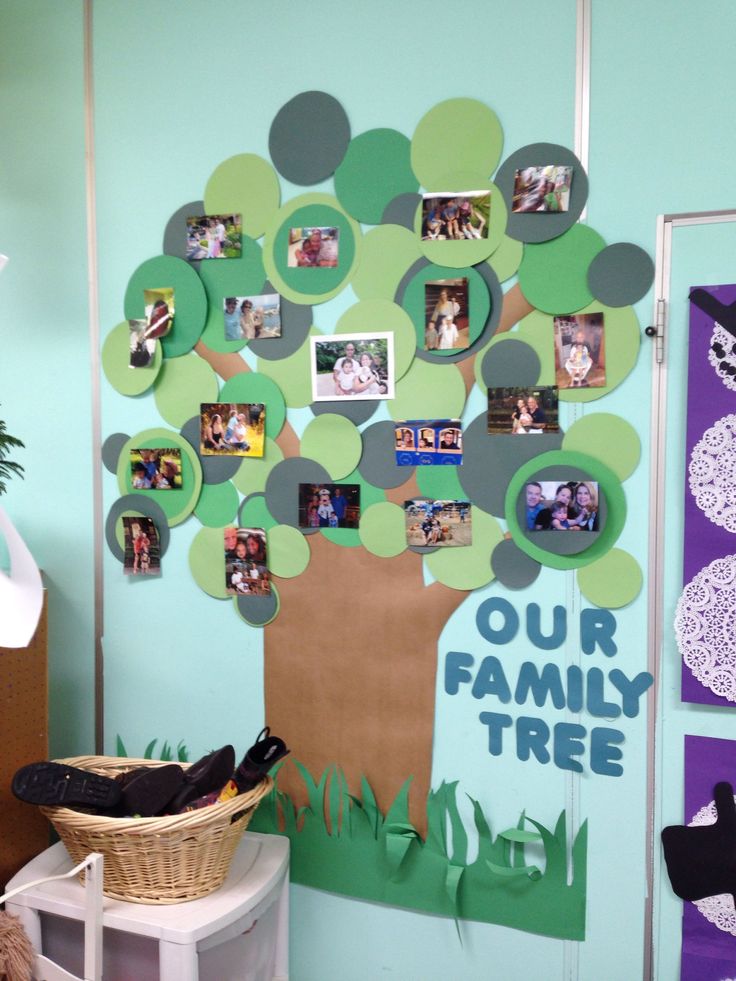
Rituals that boost positivity
Try the suggestions below to help your family de-stress, reflect, and ultimately boost positivity.
7. Family Cuddle Time - Kelly Holmes, the author of Happy You, Happy Family, found an after-school/after-work ritual that helps her family slow down and spend genuine quality time each day. Every day when her family arrives home, they pile into bed together and cuddle for five minutes.
They call it “family cuddle time” or “cozy up in bedtime.” They spend the five minutes cuddling, talking, and laughing together as a family.
As a result, their evenings are happier and less stressful. Family members laugh more, help more, and argue less.
8. Reflecting on the Day - Another element of family cuddle time is discussing each family member’s day. However, this can be incorporated into just about any ritual, including dinner and bedtime rituals.
Sometimes, talking to your kids about their day isn’t easy.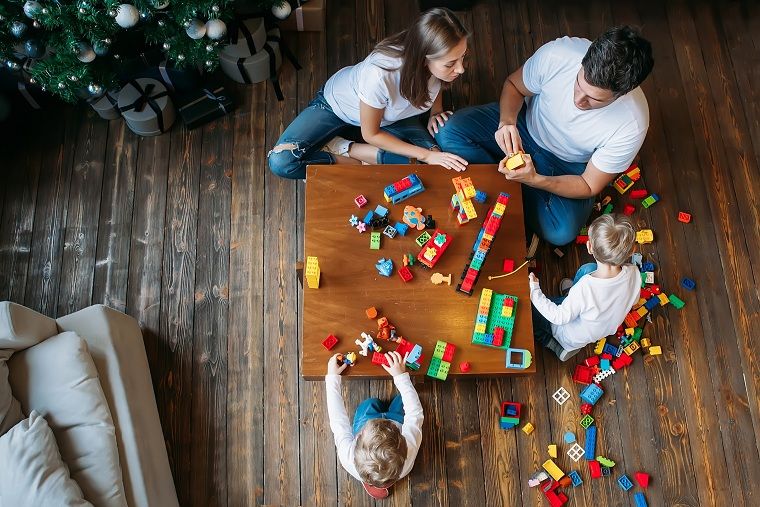 They may be hesitant to share or dismissive of your questions. Use the following tips to make the most out of this ritual:
They may be hesitant to share or dismissive of your questions. Use the following tips to make the most out of this ritual:
- Make sure you’re not using “yes” or “no” questions. Instead, ask questions that begin with “how” or “why.”
- Make the questions fun! It shouldn’t feel like a test, and your child shouldn’t feel put on the spot.
- Listen to your kids instead of guiding them to give any particular answer. If your child responds with, “I don’t know,” explain that there’s no right or wrong answer to your question.
Family sharing rituals can also be more specific, like having everyone say one thing they’re grateful for at Sunday dinner or sharing one success and one challenge each day.
9. “High, Low, and Buffalo” - Another idea is “High, Low, and Buffalo” as suggested by Audrey Monke, summer camp director and mother of five. Each family member shares the high point of their day, the low point of their day, and a buffalo (anything else they would like to share).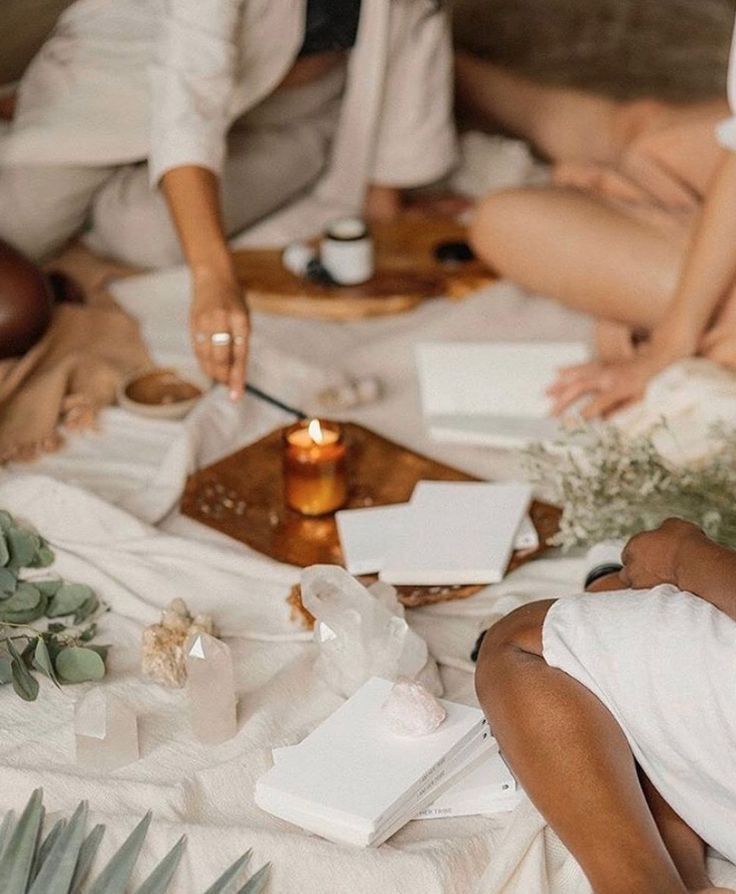
Open communication, laughter, and understanding will promote positivity that brings your family closer.
Rituals that build a strong family connection
Bedtime and dinnertime rituals are among the best ways to foster connection with your family members.
Bedtime rituals give you a chance to connect with your children and help them relax before they go to sleep. You may want to try some of the ideas below, or a combination.
10. Massage - If your child responds well to touch, end each evening with a calming massage before bed.
11. Songs - Choose a few favorite songs to use as “goodnight songs,” or have your child pick a song each night.
12. Stories - As with songs, you may have a few favorites that you use each night, or you can allow your child to choose nightly. Pull a few selections from our list of Top 85 Growth Mindset Books for Kids. And to foster their creative skills, ask your children to choose three objects or characters, then ask them to tell you a story based on their selections.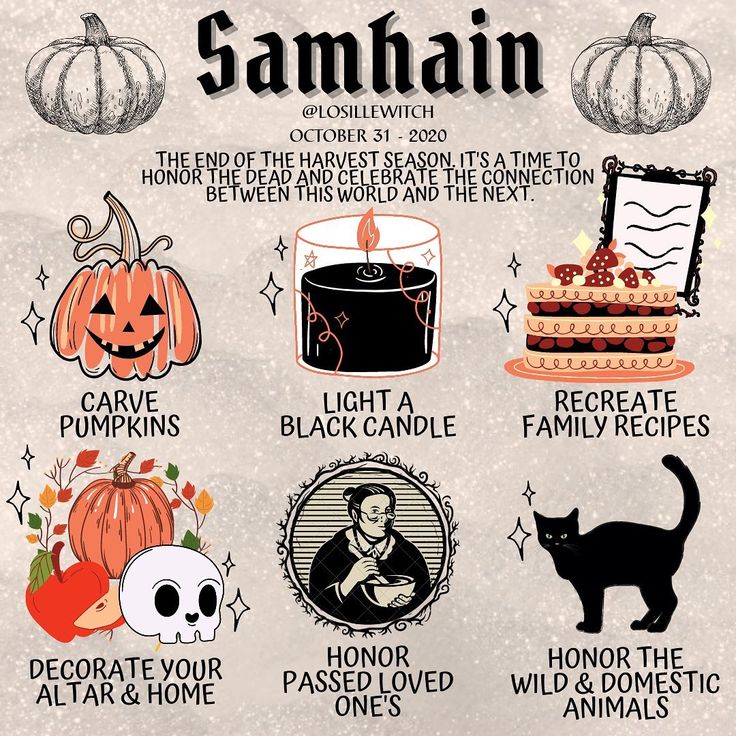
13. “Goodnight, Nose!” - Bedtime rituals can also be something silly, like saying, “Goodnight, nose!” while tweaking your child’s nose, then, “Goodnight, toes!” while gently tickling her toes, and so on, saying goodnight to various parts of your child’s body.
14. Love List - When you tell your child goodnight, you can say, “Mommy loves you. Daddy loves you. Grandma loves you,” going through a list of the many people who love and accept your child.
Dinnertime rituals are very powerful. Shared family dinners are associated with academic achievement, improved moods, and lower depression and anxiety rates. They’ve also been shown to decrease the likelihood of high-risk teenage behaviors like drinking, drugs, violence, and sexual activity.
15. Sharing Time - Take turns going around the table and sharing about your day each evening.
16. Shared Tasks - Have each family member contribute something to dinner preparation, making meal prep a shared endeavor.
17. Take Turns - Take turns choosing your favorite meals based on a schedule, random drawings, or specific achievements.
18. Theme Dinners - Have weekly “theme” dinners, like Taco Tuesday, Pizza Fridays, Sunday Sundaes, etc. These are even more fun if you incorporate a toppings bar and let each family member personalize their tacos, pizza, or sundae.
19. Sample New Foods - Sample dinners from different cultures each month or try (and rate) different cheeses as appetizers. Maybe you even have a special family blessing you say each night or a dessert you make when someone in the family reaches a major goal or achieves something awesome.
It doesn’t matter how complicated or simple your rituals are - the point is that they make dinner a memorable and meaningful time for your family to connect.
Don't forget to download our FREE Personal & Family Values. These colorful and easy-to-use cards will help guide you and your family in making the right choices.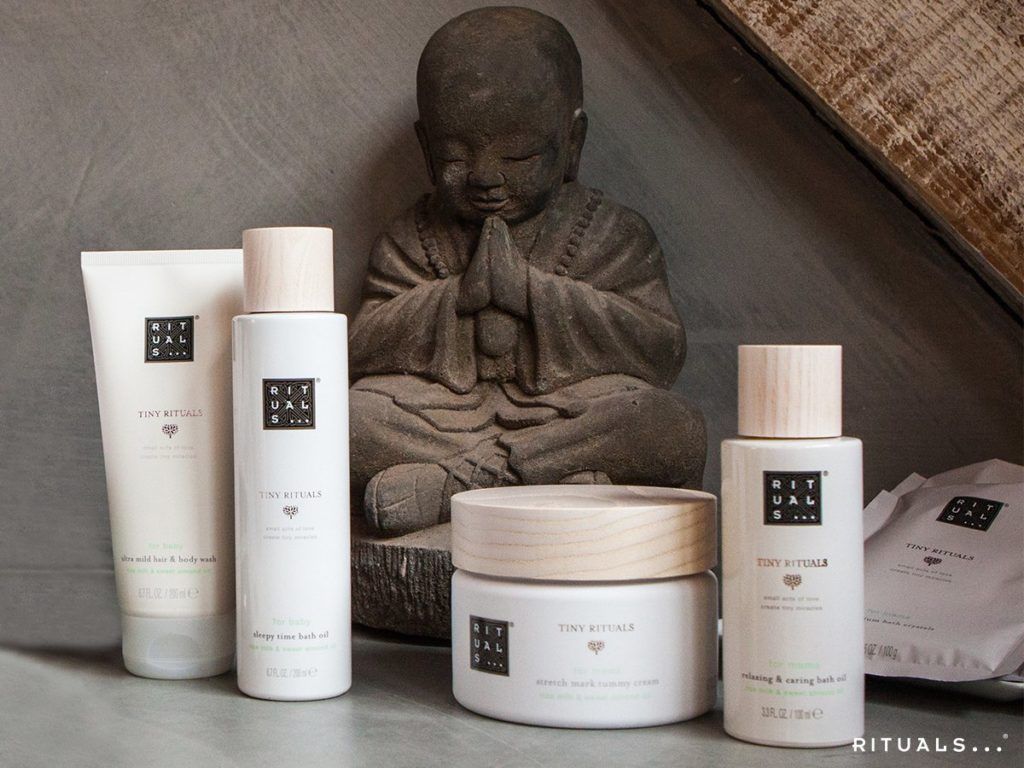
Rituals that develop a sense of belonging
The best rituals also give children a sense of belonging and acceptance. This can be accomplished with something as simple as a special greeting or farewell.
20. Special Greetings/Farewells - For instance, say, “See you later, alligator!” while your child responds, “After a while, crocodile!” Alternatively, you say goodbye to your child with a “kissing hand,” as in the popular children’s story A Kissing Hand for Chester Raccoon.
21. Special Handshakes - Have a personalized handshake with each of your children, making them feel unique and special.
Even these brief rituals demonstrate that your child is a cherished part of something special: your family.
Holiday rituals and unique family events also send the message that your family is a unit and that your child is an accepted and important member of this unit.
If your family celebrates Christmas, try the following:
22.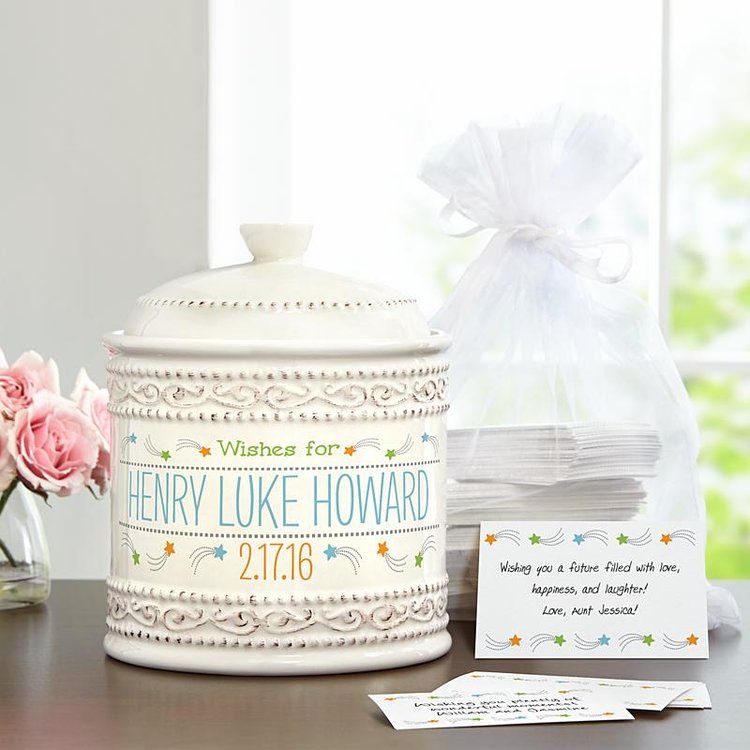 Hayride - Go on a hayride each year, perhaps around a Christmas tree farm where you pick out your tree annually.
Hayride - Go on a hayride each year, perhaps around a Christmas tree farm where you pick out your tree annually.
23. Christmas Lights - Drive around the neighborhood marveling over the Christmas lights, then vote on the best-decorated houses.
24. Decorating the Tree - Decorate the tree while listening to carols, then eat bowls of chili by the fireplace.
25. Ornament Traditions - Each year you can make ornaments with your children, or you buy a special ornament symbolizing something that happened that year.
26. Reindeer Food - You can leave cookies out for Santa and celery and carrots for the reindeer too.
If you celebrate Hanukkah, consider the following ideas:
27. Personalized Latkes - Make customized latkes with ingredients that your children select.
28. Dreidel - Play dreidel with jelly beans or other candies, making it more personalized and exciting for your children.
29. Songs - Sing Hebrew songs, particularly any family favorites or songs that hold significance to you and your family.
30. Act - Act out stories like the story of the Maccabees, complete with fake swords.
New Year’s is a great time for reflection on the year, and these rituals can help you take a look back:
31. Family Videos - Watch family videos or a slideshow of pictures to reflect on the year, laugh and discuss your best family moments.
32. Show Gratitude - Keep a “Gratitude Jar” throughout the year. Any time you’re especially grateful for something, write it on a slip of paper and put it in the jar. You can then review the slips of paper at the end of the year, creating a warm and positive transition into the new year.
33. Birthday Songs - A birthday ritual can be as simple as a special birthday song that you sing.
34. Personalized Cake - Make a special cake for each family member’s birthday (their favorite kind, of course).
35. “Anything Goes” Breakfast - Or perhaps on birthdays, your kids can eat anything they want for breakfast, even cupcakes or ice cream!
36. Invent Family Holidays - In my family growing up, we had Mother’s Day, Father’s Day, and “Kid’s Day,” an invention of my dad’s. He would give us cards and take us to do something special. Usually, this culminated in a trip to the Dairy Queen, then eating the blizzards in a fort in our backyard.
Unique family events, like the following, promote a sense of belonging as well.
37. Weekly/Monthly Theme Nights - You might want to try introducing a theme night that your family does weekly or monthly, like Board Game Nights or Movie Nights. For movie nights, check out our list of 75 growth mindset movies for kids.
Set up specific rituals related to these nights.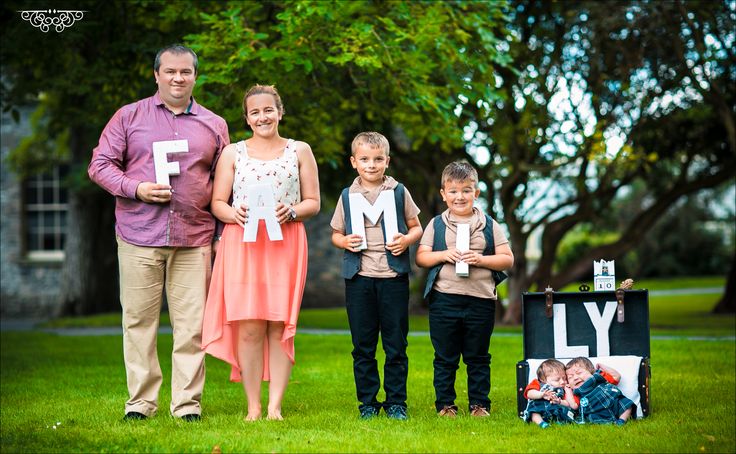 For instance, a different family member chooses the game or movie each time. Perhaps Movie Night is always accompanied by popcorn, and Board Game Night typically means pizza. Maybe the whole family wears pajamas and drinks hot chocolate.
For instance, a different family member chooses the game or movie each time. Perhaps Movie Night is always accompanied by popcorn, and Board Game Night typically means pizza. Maybe the whole family wears pajamas and drinks hot chocolate.
38. Sunday Morning Pancake Breakfasts - If every Sunday seems like too much, have a special pancake breakfast on the first Sunday of every month.
39. Monthly Nature Walks - Use our Brain-Building Nature Crafts printable to make your nature walks even more fun.
40. Favorite Restaurants - For instance, eat pizza at the same local restaurant after every soccer game.
41. Living Room “Camp-Outs” - “Camp out” in the living room monthly or every so often. You can build a tent, make microwave s’mores, tell stories, use flashlights to create shadow puppets, and so on.
Remember that creating a real family ritual means sticking with it. So think of something that every family member would enjoy - and that won’t be much of a hassle to carry out consistently.
Be sure to check out our Growth Mindset Conversation Cards to help build family connections. This beautifully illustrated deck of cards offers 52 interesting questions to help kids and grown-ups share thoughtful discussions about growth mindset, kindness, resilience, gratitude, and more.
Family rituals: why they are needed
Families differ from each other not only in the number of children, wealth and place of residence. Each family has its own traditions, customs, habits, legends that unite all its members and allow them to feel like a single whole. Such family rituals often constitute the most precious memory of childhood, which remains with a person for life.
Rituals are not a daily routine. Symbolically, rituals help to voice and convey to children the thought: “This is who we are, this is what we are, this is what we value and love”, provide a link between generations. And the daily routine is just a list of what needs to be done in order for life to go on as usual.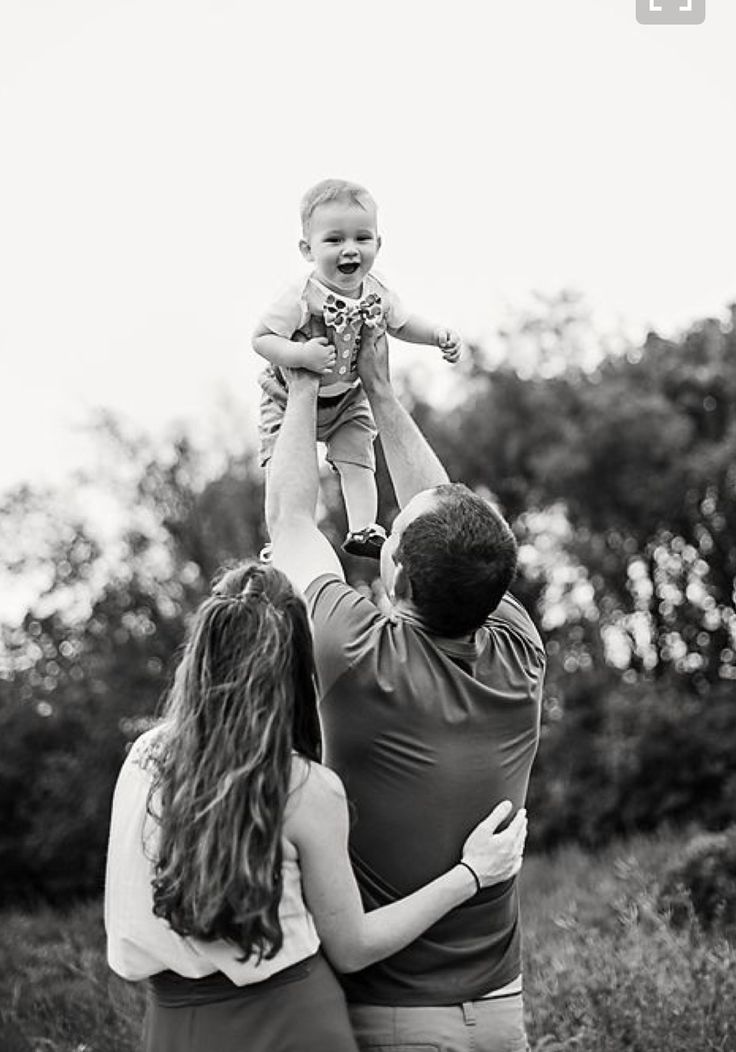 nine0005
nine0005
For example, a child goes to bed every day at nine o'clock in the evening - this is an element of the daily routine. But the special words that a mother says to her son before going to bed, a kiss, a song or a joke, reading a fairy tale, or even a moment when a mother tucks a blanket around her daughter to make her feel comfortable - this is personal, additional, this is a ritual.
Why rituals are important
“Family rituals allow you to create or restore a friendly atmosphere in the home, cohesion between family members, give a sense of confidence and stability, and are the basis for raising children,” says psychologist Natalia Vishnevskaya. - Good family relations, mutual understanding and respect, common goals and interests - all this and much more is formed thanks to family rituals. Their observance affects the formation of their own identity in children, affects their health, academic achievements, further work and satisfaction with life in the family.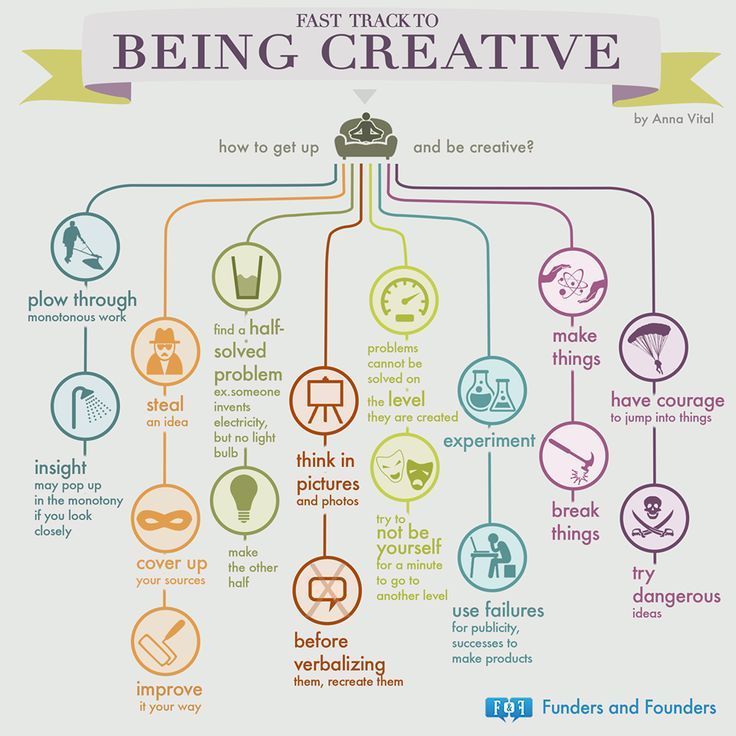 nine0005
nine0005
Maintaining family rituals during difficult times, such as when parents divorce or move to another city, reduces conflict and helps the child adapt to change. Rituals provide a sense of security in a turbulent world and contribute to a positive perception of change, work as a comfort in a stressful situation.
Natalia Vishnevskaya, psychologist
For example, the tradition of sending postcards for the New Year or from travels, congratulating relatives and friends over the phone on all holidays reflects the value of support, gives the feeling that we are not alone. The tradition of feasts reflects the idea of the strength of family ties. It is important to hold such festive feasts according to a certain scenario, where there is a place for competitions, games, and even simple theatrical performances in which all family members take part. Family customs help the child feel that he can count on the help of loved ones, that he will not be left in trouble, they will stand up for him, he has someone to rely on.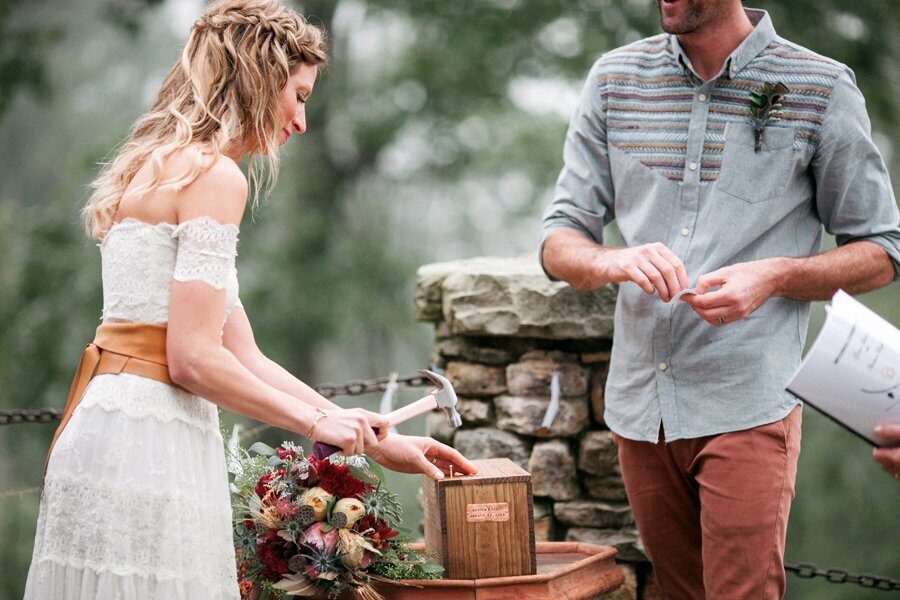 nine0005
nine0005
Where rituals come from and how to create them
Some family rituals can be passed down from generation to generation, from grandparents, for example, to celebrate some significant holidays in a special way - religious, state or domestic. One of the common rituals in families with small and not very children is reading at night or a heart-to-heart conversation before going to bed with a discussion of the events that took place during the day. But each family can come up with their own, unlike others, special ritual, which can later become part of the family tradition, family traditions. nine0005
The meaning of the ritual is to keep it constant, so when creating new rituals, choose something that will please everyone and will not require much effort to perform.
Rituals can change over time, and this is not bad, but on the contrary, it shows that the family is a living organism, a structure where people can listen and hear each other. “For example, teenagers may get bored with weekly dinners with relatives at some point, and they should not be forced to attend these dinners,” advises Natalia Vishnevskaya.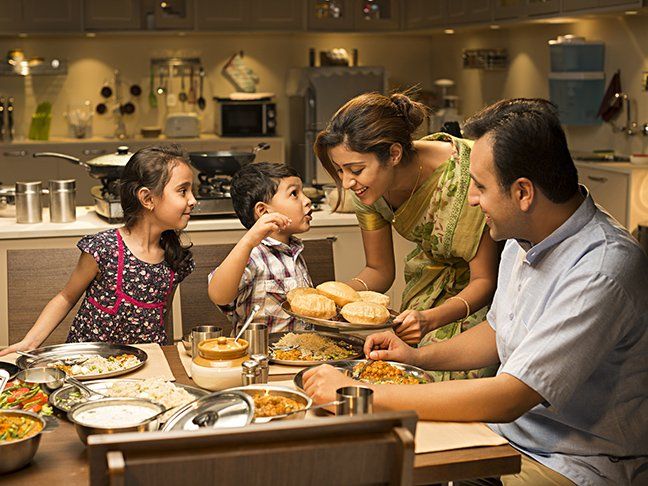 “From now on, it will be weekly dinners with relatives without children.” Perhaps later, a teenager who has turned into a young man will remember the old ritual of having dinner with his family every week and appreciate it in a new way, return to it. nine0005
“From now on, it will be weekly dinners with relatives without children.” Perhaps later, a teenager who has turned into a young man will remember the old ritual of having dinner with his family every week and appreciate it in a new way, return to it. nine0005
7 ideas for family rituals
1. Joint housework turned into a game. She will teach children responsibility. In addition, helping adults, children will feel needed, special. For example, each member of the family is assigned a task when setting the table: someone takes out plates, someone lays out napkins, someone puts cutlery. This can be done to your favorite music in the family.
2. Family volunteering. You can do good deeds with the whole family in an animal shelter or in a nursing home, in any charity organization you like that needs volunteers - the main thing is that adults have a desire to show their children the importance of empathy. nine0005
3. Family hug time. There is a ritual that helps the family to slow down after work and school and have a good time together. Every time the family gets together at home, they all get on the sofa together and hug for 5 minutes. It's called Family Hug Time.
Every time the family gets together at home, they all get on the sofa together and hug for 5 minutes. It's called Family Hug Time.
4. Morning and evening greetings. For example, say to your son in the morning: “Good morning, my dear!” or in the evening of the daughter: “Good night, princess!” Warm words, cute nicknames and hugs from parents are the key to a child's good mood, his high self-esteem. nine0005
5. Sunday breakfast for the whole family when no one is in a hurry. During breakfast, you can chat about how the week went: what new children learned, what adults saw new, discuss plans for the future.
6. Cooking your favorite holiday food together. For example, baking a cake according to a grandmother's recipe or making dumplings for the New Year's table with the whole family is also an opportunity for family members to communicate, joke and strengthen ties.
7. Parents' day. nine0032 When children do everything for their parents: they clean, cook, set the table.
Three Rules of the Ritual
- The ritual is regularly repeated. In this case, the frequency of the ritual can be any.
- All family members participate in the ritual voluntarily and enjoy it.
- The ritual is perceived as something important, personal and bringing the family together. The options here are only limited by your imagination and what exactly your family means to you. nine0062
You can go to the cinema together once a month, and then to a cafe, arrange a trip to interesting neighborhoods every vacation. It can be agreed that every Sunday mom, dad and children take turns preparing some new dish, surprises are arranged for each family member on their birthday, and once a month everyone goes for a walk in their favorite park, participates in bike rides or plays basketball (football). , tennis).
Interviewed by Anna Demina
Photo: Pixabay, Unsplash
37 FAMILY TRADITIONS THAT TEACH RESPONSIBILITY, KINDNESS AND EMPATHY | Losino-Petrovsky
You probably have your own family traditions that you don't even know about.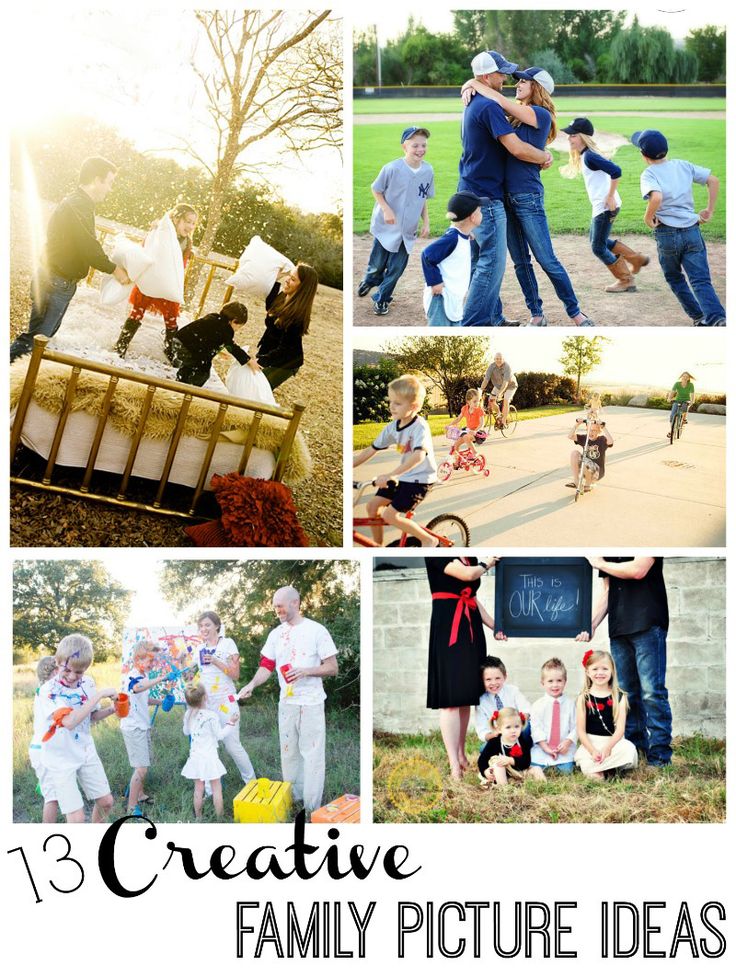 But if you don't have any or would like to come up with some new ones, you'll love these ideas.
But if you don't have any or would like to come up with some new ones, you'll love these ideas.
What is a family ritual?
Sometimes it is difficult to distinguish between family ritual and daily routine. As psychologist Barbara Fize says, rituals convey an understanding of “who we are” on a symbolic level, providing a link between generations. And the daily routine is “this is what should be done.” nine0079 For example, bathing every day at 7pm and going to bed at 8:30am is part of the daily routine. But if you add something of your own, personal to the routine - some special song, a kiss, a handshake - you turn the routine into a ritual.
Why rituals are so important
Family rituals allow you to slow down and restore the connection between family members. A 50-year study of family rituals published in the Journal of the American Psychological Association (APA) found that they provide a sense of stability and are associated with adolescent self-identity, children's health, academic achievement, and family life satisfaction. nine0079 Maintaining family rituals even during transitional periods, such as divorce, reduces conflict and helps children adapt to change.
nine0079 Maintaining family rituals even during transitional periods, such as divorce, reduces conflict and helps children adapt to change.
So, 37 family ritual ideas:
Rituals that teach responsibility
The phrase "housework" usually has a negative connotation, but it can be made into a positive family ritual that teaches responsibility. In many cases, children don’t mind helping — at such times they feel special and capable. nine0079 1. Orders. For example, each family member is assigned a different task when the table is set: someone clears the table, someone lays out napkins, someone puts cutlery, and someone lights candles. This can be done for your personal (or family) music selection.
2. Repetitive housework. For example, a to-do list on the board in the kitchen that changes every Sunday. Or you can write the tasks for each family member for the week on ice cream sticks and place them next to the name of each family member. nine0079 3. Dedicated time for housework.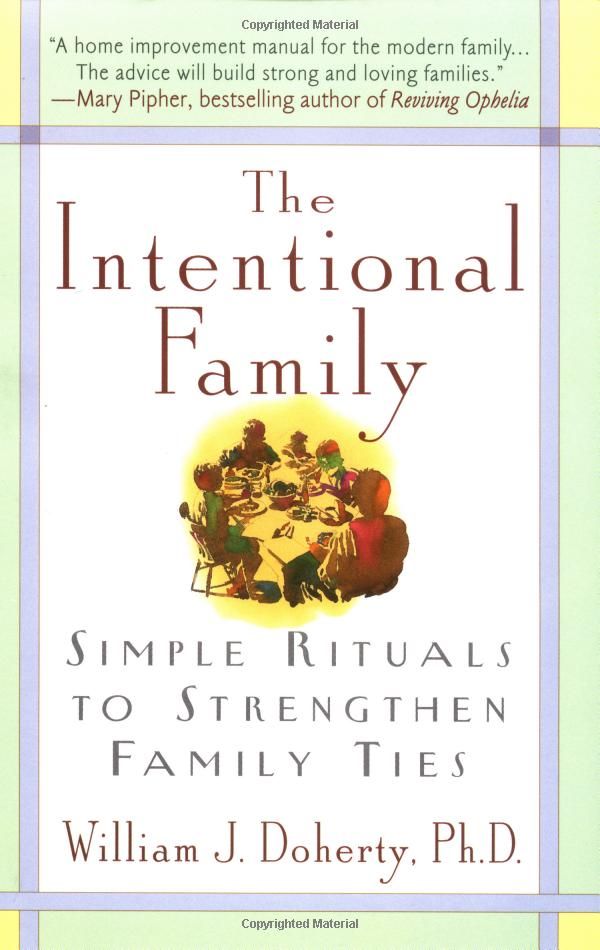 Designate a specific time each week (usually Saturday or Sunday) when the whole family gets together and cleans up. You can turn on loud music, chat, laugh, dance, but the housework must be done.
Designate a specific time each week (usually Saturday or Sunday) when the whole family gets together and cleans up. You can turn on loud music, chat, laugh, dance, but the housework must be done.
4. Collaborative Projects It's always fun to work on something together, whether you're peeling potatoes, painting a wall, or putting together a new baby crib.
These rituals show children that even hard work can be fun. And they learn responsibility from an early age. nine0005
Rituals that help develop kindness and empathy
5. Love and kindness meditation—when we need to think about those we love and send them positive thoughts or good wishes. Four traditional phrases: may you be safe, may you be happy, may you be healthy, may you have an easy life. But the wording itself is not important, what is important is the feeling of kindness and warmth.
Research has shown that meditation on love and kindness increases awareness, helps you find purpose in life, and promotes positive social behaviors such as generosity. nine0079 6. Family volunteering. Find a place where you can volunteer with the whole family, such as an animal shelter or a nursing home. Or you can help disadvantaged children by donating food, clothing, school supplies, or toys.
nine0079 6. Family volunteering. Find a place where you can volunteer with the whole family, such as an animal shelter or a nursing home. Or you can help disadvantaged children by donating food, clothing, school supplies, or toys.
When you volunteer with the whole family, you set an example of empathy and kindness for children.
Rituals that encourage a positive attitude towards life
These rituals help the family relieve stress, learn to reflect and stimulate a positive attitude towards life. nine0079 7. Time for family hugs. Kelly Holmes, author of Happy, Happy Family, has come up with a ritual that helps her family slow down after work and school and spend quality time together. Every time the family gathers at home, they climb onto the sofa all together and hug for 5 minutes. They call it "family hug time."
As a result, their evenings are happier and calmer. They laugh more, help each other more and argue less.
8. How was the day. Another good ritual is to ask family members how their day went.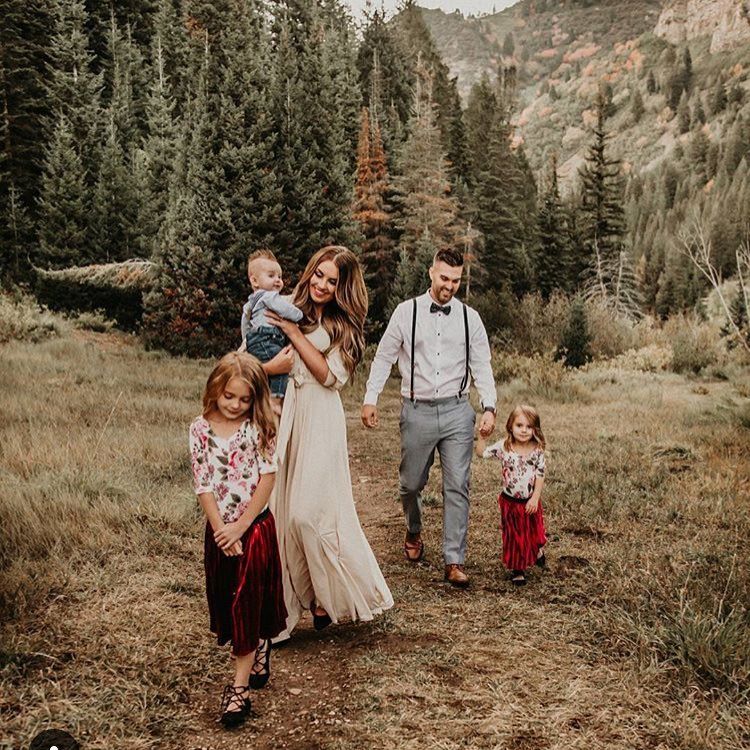 Although it can be built into any other ritual, such as dinner or falling asleep. nine0079 Sometimes talking to children about how the day went is not easy. They may hesitate to tell or not, or evade answering. There are a few tips for getting your child to talk:
Although it can be built into any other ritual, such as dinner or falling asleep. nine0079 Sometimes talking to children about how the day went is not easy. They may hesitate to tell or not, or evade answering. There are a few tips for getting your child to talk:
• Don't use the words yes and no. Instead, ask questions that begin with "why" or "how."
• Ask funny questions. This is not a test or an exam, and your child should not feel like they have their back against the wall.
• Listen to your children instead of leading them or giving them a specific answer. If the child says "I don't know", explain that there is no right or wrong answer to your question. nine0079 This ritual can be made more specific, when, for example, at Sunday lunch, everyone talks about what happened this week and for which someone or something can be thanked. Or the family shares their successes and failures that happened during the day.
9. "Above, below and Buffalo." This idea was proposed by the director of the summer camp and the mother of five children, Audrey Monke. Each family member talks about the best moment of the day, the worst and buffalo (anything you would like to talk about). nine0079 Open communication, laughter, understanding set you in a positive mood and bring your family closer.
Each family member talks about the best moment of the day, the worst and buffalo (anything you would like to talk about). nine0079 Open communication, laughter, understanding set you in a positive mood and bring your family closer.
Rituals That Provide Strong Bonding Between Family Members
One of the best ways to ensure strong bonding between family members is to have dinner or go to bed together. Children, thanks to co-laying, feel connected with their parents and relax.
10. Massage. If your child loves to be touched, give him a soothing massage before bed.
11. Songs. Choose (or let the child choose) a favorite song as a lullaby. nine0079 12. Stories. Choose your favorites to tell every night, or let your child choose a story for each night. To encourage creative thinking, choose any three things or three characters and have your child tell a story about them.
13. "Good night, nose." Bedtime rituals can seem ridiculous, such as saying “goodnight, nose” every night by gently pressing the tip of the child’s nose, or “goodnight, fingers” by tickling the child’s feet. But it's important for kids. nine0079 14. List of love. When you tell your child, “Mom loves you. Papa loves you. Grandma loves you,” naming all the people who love and accept your child.
But it's important for kids. nine0079 14. List of love. When you tell your child, “Mom loves you. Papa loves you. Grandma loves you,” naming all the people who love and accept your child.
Dining rituals are very important. Shared family meals have been linked to academic achievement, good mood, and less common depression and anxiety. They also reduce the likelihood of adolescent risk behaviors associated with alcohol, drugs, violence, and sexual activity.
15. Shared time. Take turns at lunch or dinner to talk about what happened during the day. nine0079 16. Joint tasks. Let each family member contribute to the preparation of lunch or dinner.
17. Compliance with the queue. Take turns choosing your favorite dishes based on a regular schedule or focusing on special occasions.
18. Theme dinners. Host themed dinners once a week, such as pancakes on Tuesdays, pizza on Saturdays, and ice cream on Sundays. It is also interesting to make a special topping menu so that all family members can choose what to add to their pizza - extra cheese, sausages, herbs or something else.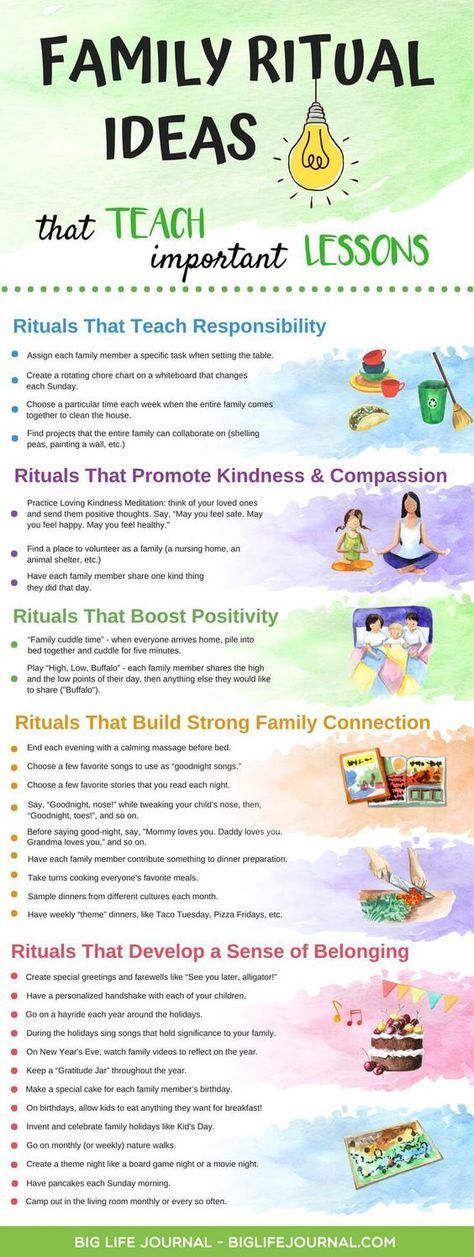 nine0079 19. Try new cuisine. Have a cultural dinner every month, or just try a new cheese or something new. You can also cook a new dish or bake a cake in honor of some achievement of one of the family members.
nine0079 19. Try new cuisine. Have a cultural dinner every month, or just try a new cheese or something new. You can also cook a new dish or bake a cake in honor of some achievement of one of the family members.
It doesn't matter how complex or simple your ritual is. The main thing is that thanks to this, family dinners will become a memorable event and will bring joy to the family.
Rituals that develop a sense of belonging
It's one of those things that gives children a sense of security, belonging and acceptance.
The ritual can be just an unusual greeting or farewell.
20. A special greeting or farewell. For example, say goodbye “See you later, alligator!”, And the child replies “After a while, crocodile!” (hello, crocodile / bye, hamadryan, see you by the river). Or you can say goodbye to a child with the help of a “kiss in the palm of your hand”, as in the fairy tale about Chester the raccoon and his mother, who left a kiss in her paw in parting so that Chester would not be bored without her.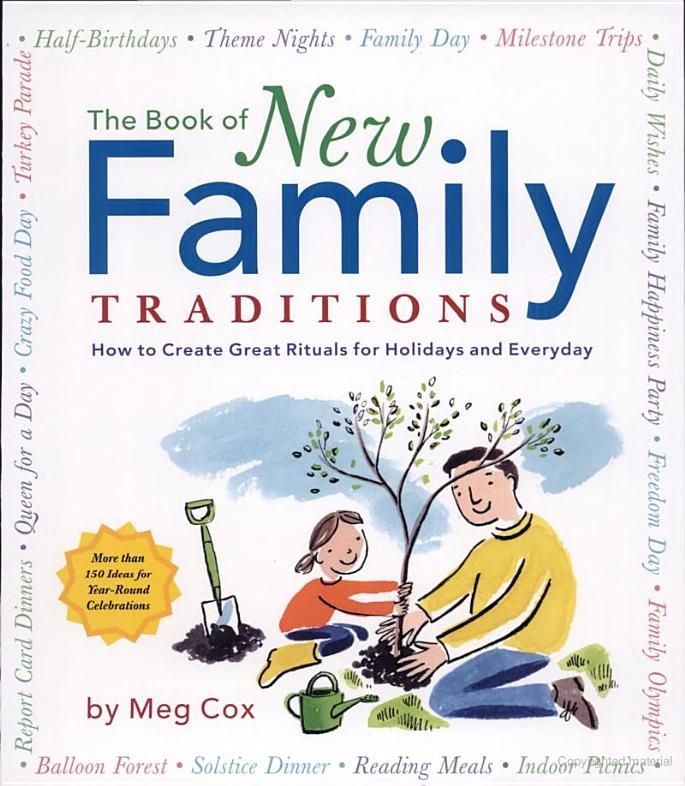 nine0079 21. Special handshake. Come up with your personal handshake with each of the children. Even such a short ritual demonstrates to the child that he is special and an important part of the family.
nine0079 21. Special handshake. Come up with your personal handshake with each of the children. Even such a short ritual demonstrates to the child that he is special and an important part of the family.
Holiday rituals and special events in the family tell the child that he is part of the family and important to her.
If you are celebrating Christmas or New Year, try the following:
22. Hike for the tree. Arrange a whole ritual, a pleasant event from the choice of a Christmas tree.
23. Christmas garlands. Walk around, choose the most beautifully decorated house, or vote for the best garland. nine0079 24. Christmas tree decoration. Listen to New Year's songs or Christmas carols while you decorate the tree, then light the candles and eat something delicious.
25. Traditional Christmas toy. Every year, make some kind of Christmas decoration yourself or buy a Christmas tree toy that symbolizes an important event in the outgoing year.
26. Treat for Santa Claus. For Santa Claus, you can leave a cookie or other edible surprise.
For Santa Claus, you can leave a cookie or other edible surprise.
The New Year is a time to reflect on how the old year went, and these rituals will help you look back:
27. Family videos. Watch family videos or photos to remember the past year, laugh and talk about the best moments of it.
28. Thanks. Get a "jar of gratitude" - at any time when you are grateful to someone, write down the words of gratitude on a piece of paper and put it in the jar. At the end of the year, it will be possible to get them and read them aloud - this will be a great transition from the old year to the new one.
29. Songs for birthdays. The birthday ritual can be as simple as singing a special personal song to the birthday person. nine0079 30. Personal cake. For the birthday of each of the family members, you can prepare a special cake (of course, the one that the birthday person loves the most).
31. Breakfast, when you can do anything. For example, on a birthday, you can arrange a breakfast of naughty, when you can eat anything, even cakes and ice cream!
32. Come up with your own family holiday. In my family, growing up, we started celebrating Mom's Day, Dad's Day, and Children's Day - my dad's invention. He signed us postcards and gave us something unusual. Usually on this day we went for milkshakes and ice cream, and then ate them in our backyard fort. nine0005
Come up with your own family holiday. In my family, growing up, we started celebrating Mom's Day, Dad's Day, and Children's Day - my dad's invention. He signed us postcards and gave us something unusual. Usually on this day we went for milkshakes and ice cream, and then ate them in our backyard fort. nine0005
Unusual family holidays also help to develop in children a sense of belonging to the family.
33. Theme nights once a week or once a month. You might want to host a board game night or movie night once a week or once a month. Buy interesting games or make a selection of good family movies and have fun.
Think of a special ritual for such evenings. For example, each time a movie or a game is chosen by one of the family members. Maybe movie night will always be popcorn and game night pizza. Maybe all family members will put on pajamas and drink hot chocolate. nine0079 34. Fritters on a Sunday morning. If pancakes every Sunday seem too frequent for you, arrange such a breakfast every first Sunday of the month.